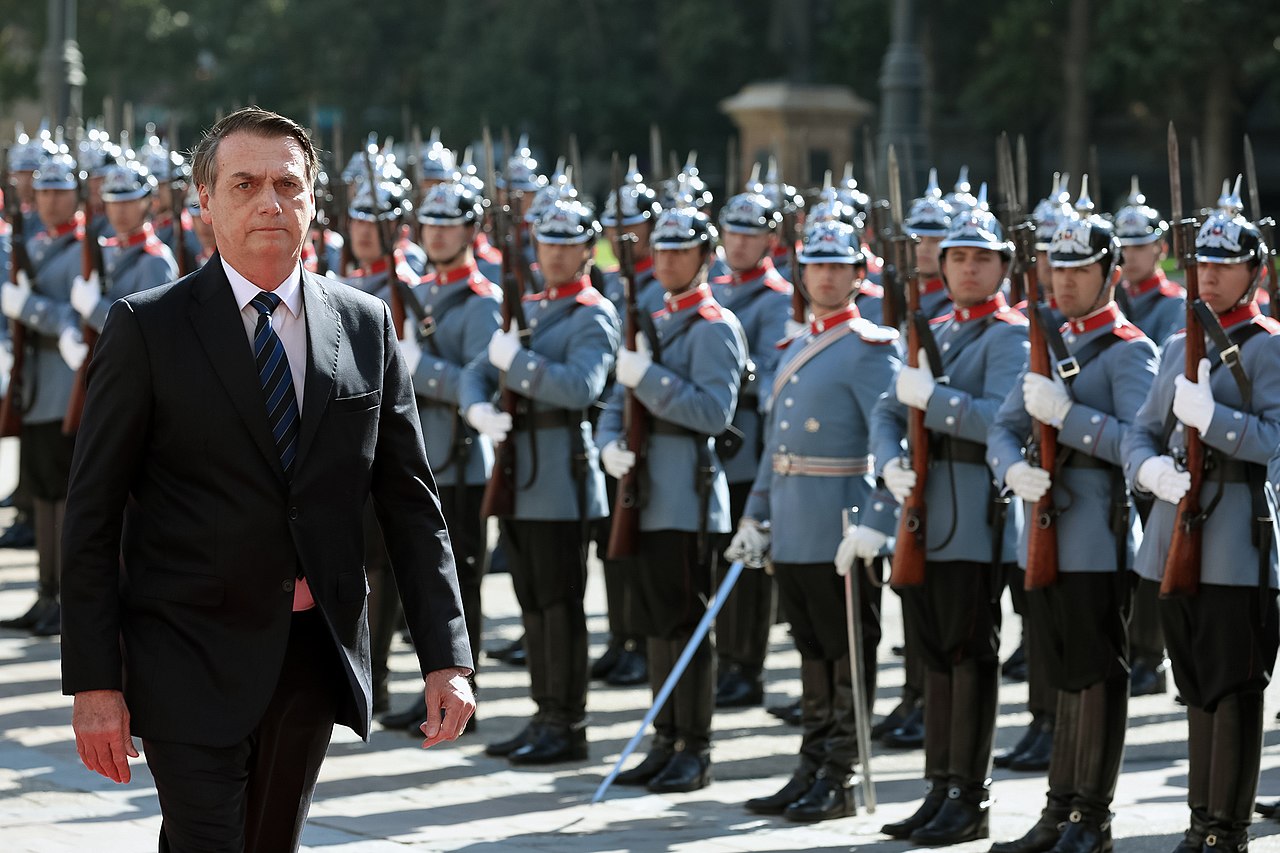Bolsonaro
Far-right leader Jair Bolsonaro was elected President of Brazil in October 2018, and took office in January 2019, winning the second round of the election over Parti Trabahadores (Labour Party, PT) candidate Fernando Haddad by 55% to 45%.
Bolsonaro’s election gave rise to grave fears among large sections of Brazilian society, and threatens to undermine Brazil’s democratic progress since the end of military rule in 1985. Since his election, killings by police, attacks on indigenous people, and deforestation of the Amazon have increased. He has minimised the Coronavirus pandemic, describing it as a “little flu“, and failed to take action to control it. Brazil has had one of the worst outbreaks in the world, with deaths reaching 200,000 in January 2021, while Bolsonaro claimed that the Covid-19 vaccine could “turn you into an alligator”.
Bolsonaro’s far-right agenda
Jair Bolsonaro is a fascist. His election is a grave threat to people of colour, indigenous people, LGBT people, residents of favelas, progressive social movements, and basically anyone who isn’t a well-off straight cisgendered white male. Below, in no particular order, is a list of some of his most horrendous statements and policy positions:
- He has repeatedly expressed admiration for Brazil’s military dictatorship. Indeed he said their mistake was not to go far enough.
“The dictatorship’s mistake was to torture but not kill.”
- He has promised to ban the PT and left-wing NGOs, and “cleanse Brazil of leftists”.
- He is explicitly pro-torture.
- He is equally explicitly misogynistic. He said he had his fifth child, a daughter, in a “moment of weakness” after 4 sons.
- He is just as explicitly homophobic, saying that he would rather a son of his would die in a car crash than bring home a boyfriend.
- He has frequently expressed contempt and hatred for Brazilians of African descent and indigenous Brazilians. He has described Afro-Brazilians as “not even good enough for procreation”.
- He has vowed to end demarcation of indigenous lands, and to arm ranchers.
- He has promised to further militarise the police, give them even greater licence to kill with impunity; he says they should “kill criminals on sight”, and loosen public gun laws.
- He has handed over responsibility for the Amazon to the Ministry of Agriculture, indicating an intention to promote further deforestation.
- His economic programme also doubles down on a vicious Neoliberal agenda, now backed by even harsher repression.
Sources: The Guardian (6 October 2018); Al Jazeera (1 January 2019); The Guardian (31 October 2018); The Independent (8 October 2018); The Independent (29 October 2018); Huffington Post (29 October 2018).
Resistance
There is nonetheless a powerful resistance movement to Bolsonaro that has grown up among the people most threatened by his regime, with women and people of colour in poor communities leading the way. In the UK, Brazilian Women Against Fascism UK supports their efforts.
Background: a Fascist’s rise to power
Bolsonaro’s victory followed several years of increasing political chaos and corruption among Brazil’s political classes, and a loss of trust in politicians.
The Lava Jato (Car Wash) corruption investigation that began in 2014 and came to public attention in 2015 has encompassed huge swathes of Brazilian industry, politics, and society. At the time, PT President Dilma Roussef was in power, and was elected to a second term in 2014. However, her popularity declined as the corruption scandal spread, although she was not personally implicated, and in the face of economic recession.
Large-scale protests, which had started in 2013, increasingly sought her resignation or impeachment as time went on. In August 2016 she was successfully impeached by Congress in what many of her supporters and others on the left regarded as a constitutional coup. A large proportion of the MPs who supported the impeachment were themselves under investigation for corruption, and some of the leading figures are now in prison.
The process was led by then Vice-President Michel Temer, who became President upon Roussef’s departure. A close ally of Temer was caught on tape discussing the impeachment of Roussef as a way of halting corruption investigations into Temer and his associates. Temer was himself arrested for corruption in March 2019.
Temer’s new government immediately imposed sweeping austerity measures and an aggressive Neoliberal agenda, which did nothing to alleviate the political and economic crisis. In 2018, faced with approval ratings of 5%, he did not seek re-election.
The most popular candidate for the Presidency was ex-President Lula; however, his corruption conviction in 2017, in proceedings widely condemned as politically motivated, meant he was barred from standing. (Sergio Moro, the judge overseeing Lula’s case, was awarded a ministry in the Bolsonaro government.
The PT’s replacement for Lula as candidate for President, Fernando Haddad, lacked Lula’s electoral appeal. In Brazil’s febrile political atmosphere, economic crisis, and rampant violence, Bolsonaro’s ‘strong leadership’, promise of a hard line on security, and his claim to be a ‘political outsider’ untainted by corruption, won out.

